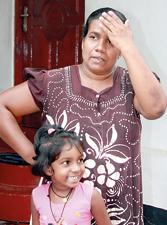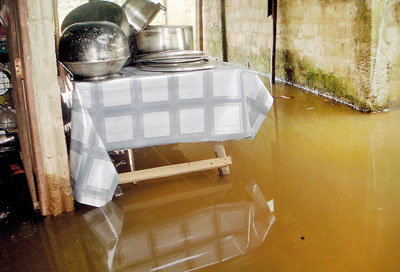News
Garbage strikes back: Disposes people of their homes
The controversy over the Kolonnawa garbage dump which has collapsed on houses and the offer of rent for residents who have lost their houses, will be taken up for discussion with Defence Secretary Gotabaya Rajapaksa and the Urban Development Authority (UDA) on Monday, Colombo Mayor A.J.M. Muzammil told the Sunday Times yesterday.
“There are residents who don’t want to leave the place, and are not willing to accept land, but want houses instead,” Mr Muzammil said.
He said the offer of Rs. 10,000 as a monthly rent for the affected families will also be taken up for discussion.
He said that as there are residents not willing to leave their houses, the council will ascertain if the UDA will allow them to live there at their own risk.

.... and a humble abode collapses as garbage comes tumbling down. Pix by Indika Handuwala
He explained that, while some of the houses were damaged, there are others which were flooded due to a blocked canal. “We have cleared that canal and the water is flowing uninterrupted again,” he said.
However, the residents of the area have a different take on the issue. Even if they give Rs. 10,000 as rental, who would rent out houses without a deposit or ‘key money’? The people of Dahampura haven’t left the area yet because they are not willing to leave their houses which were built with what little they earned, till they get permanent houses, a resident there said.
The residents are also planning to go to the Mayor’s house today (21), to discuss this matter with him, before the meeting on Monday
Dileepa Dilhani (34), a mother of two, who has been living in Dahampura, Wellampitiya for 14 years, told the Sunday Times that her house was built before the Government started using the surrounding area for a garbage dump.
“The people in this area took loans to build their houses, and are still repaying the loans. If the Government decides to give us alternate land, it won’t be of use to us, because we will have to get fresh loans to build another house,” she said.
M.A. Kanthi Perera (56) told the Sunday Times that since the cracks set in, only two houses in the area have water. “Everybody else has to go to those two houses to get their drinking water or have a wash. This is a catastrophe,” she said.
The electricity cables too have started to sag. “This is very risky. The cables are only head high. There is a real risk of people getting electrocuted,” Nihal Jayasekara (57), a father of three said.
“Our children play with these wires because they hang low. When we complained to the Electricity Board, an engineer there told us that we will have to wait till the cable falls off completely,” said Dileepa.

We don’t want to leave: Dileepa
Cracks on walls were not the first hazard that the residents faced when the garbage dumping began. Within a few weeks of garbage being dumped here, children in the area started falling ill regularly. “Children in this area have developed a rash all over their bodies,” said Dileepa, showing us her five-year-old daughter’s hand which appeared to have blisters.
The children are not the only ones who fall ill in Dahampura. “My son-in-law died of a kidney disease a few months back. My unemployed daughter has three children with no viable support. Recently, two of the kids contracted dengue too,” P.R. Nilanthi (70) said.
In the past few years, four children have died of dengue, two adults of kidney disease and a mother of three of rat fever.
“The Public Health Inspectors (PHIs) fine us large amounts even if they see a bit of stagnant water, but in the garbage dump there are old tyres, broken bottles and other objects which contain water where mosquitoes breed. There are also injection syringes and gloves used in hospitals. I have seen my children bring them and use them as play material. God knows what diseases they catch from those,” said M.M. Naushad (40) a three-wheeler driver and a father of six.
Residents also complain that when it rains even for a short time, the area is flooded, forcing residents out of their compounds, till the water level subsides. “We face this ordeal about four times a year. When it rains, we can’t sleep, because we don’t know when we will have to pack up and go elsewhere,” said K. Yoganadan (38), a father of two.
The Kolonnawa garbage dump started to collapse nine days ago, damaging 160 houses, forcing the evacuation of 512 people to a school nearby.
Daily, about 700 tons of garbage collected from Colombo City and about 100 tons collected from Kotikawatta are dumped at the Kolonnawa disposal site. This includes the garbage of the City residents as well as of the 600,000 people who come into Colombo daily.
Follow @timesonlinelk
comments powered by Disqus



























